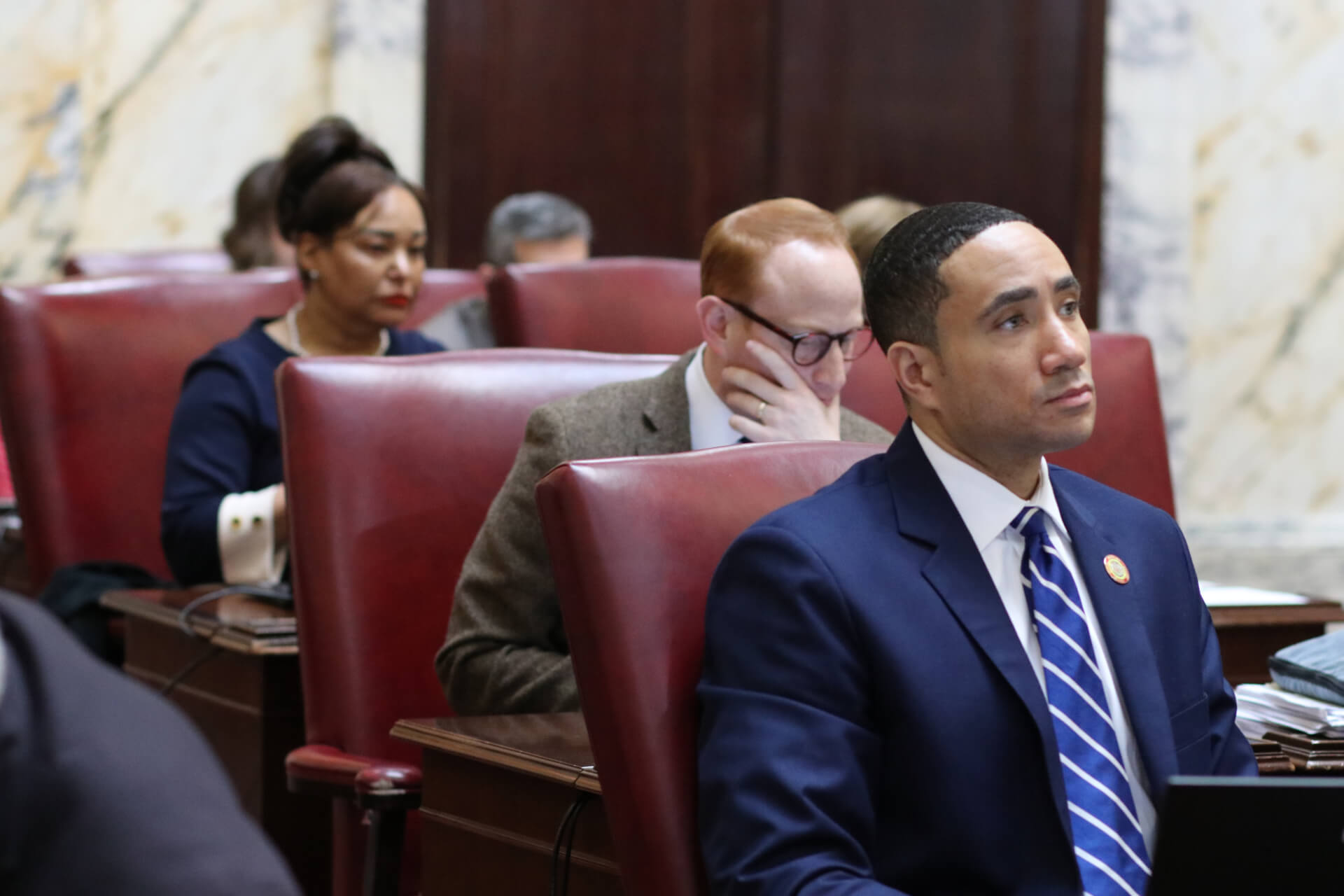Partisan Lines Harden as Senate Panel Fights Over Major Police Reform Legislation

Republicans on the Senate Judicial Proceedings Committee cried partisanship Thursday as their Democratic counterparts consistently shot down their amendments to two major pieces of police reform legislation.
Senate Minority Whip Michael J. Hough (R-Frederick) asserted that the committee has devolved into the most “rancorous, bitterest politics,” which he said has gotten in front “of what is good policy.”
“And when I was a member of the House you would often more likely see that, but the Senate is an exception and JPR had been an exception,” he said. “I’ve crossed party lines many times on this committee, trying to do what’s right, but the problem is there’s not a willingness on the other side to work on these issues anymore.”
Sen. Jill P. Carter (D-Baltimore City), a stalwart police reform advocate, said that Hough is “fortunate” if this was the first time he’s felt that there was partisanship on an issue that came before the committee.
“For many years, I’ve seen and felt the sting of this legislative body not honestly dealing with police reform and some justice issues as they need to be dealt with,” she said. “It’s been a burden on me as a legislator. It’s been a burden on the impacted people that have come down to this body, year after year after year, and begged and pleaded with us to give them some modicum of understanding, sympathy and justice under the law.”
Sen. Robert G. Cassilly (R-Harford) harkened back to words frequently uttered by Senate President Bill Ferguson (D-Baltimore City): “It’s a good thing we’re not like Washington and are bipartisan.”
But he questioned if the state Senate is only different from Capitol Hill because there’s a Democratic super-majority.
“Sometimes I feel like it’s a situation of the serial spousal abuser who’s saying, ‘See how cooperative we are? Look at the relationship we have.’ And it’s not a healthy environment,” Cassilly said.
The public display of disdain came after hours of heated discussion about two of Carter’s bills: one seeking to amend the Maryland Public Information Act to allow some officer personnel records publicly available; the other, to repeal and replace the Law Enforcement Officer’s Bill of Rights (LEOBR).
Early on in the day, Sen. Michael A. Jackson (D), a former Prince George’s County sheriff, offered up a comprehensive amendment that would have incorporated pieces of the LEOBR into Carter’s bill to repeal it.
[Read our primer on the Law Enforcement Officer’s Bill of Rights here.]
Some of it was pulled verbatim from current law, including sections that would:
- Allow officers to exercise the same right to engage in political activity as other state employees while off-duty;
- Permit officers to seek secondary employment;
- Restrict income or property disclosures;
- Mirror several aspects of the original statute’s investigation process; and
- Expunge formal complaints from an officer’s record.
Jackson’s amendment did offer fresher edits to the LEOBR, like allowing chiefs and sheriffs to exact discipline without going through a hearing if officers received a Probation Before Judgment or were convicted of fraud, deception or a crime that impacts their “credibility, integrity or honesty.”
After over an hour of discussion, Hough moved that the only way forward was to pass Jackson’s amendment so that the bill can be further amended.
“Absolutely not,” Carter told the committee.

Sen. Jill P. Carter
“I cannot believe that we just sat here and listened to an entire rewrite of the Law Enforcement Officer’s Bill of Rights posited as an amendment,” she said.
Carter asserted that Jackson’s larger amendment should have been broken into smaller single-issue modifications to the legislation, explaining that there “might have been one or two things that might have been less offensive.”
“If this is adopted as one amendment, then it is absolutely not what we intended to do with this bill,” she said.
Committee members left the camera’s view before a vote was held to adopt or reject, leaving the press and members of the public confused and staring at video footage of the empty room in silence for about 50 minutes.
Yaakov “Jake” Weissmann, a spokesman for the Senate president, said that the senators parted ways after a brief meeting with staff.
“When the meeting took more than a couple of minutes, senators went back to their office to work on constituent and legislative work,” Weissman told Maryland Matters. “Instead of trying to corral senators, the committee made a decision to adjourn for lunch.”
Following their lunch break, Jackson withdrew his amendment.
Carter was willing to adopt portions of it after it was withdrawn but was met with Republican complaints.
“The only amendment that was on the table was Senator Jackson’s,” Cassilly said. “That’s been withdrawn and no longer exists, so it’s a dead amendment by vote of this committee. So now, what are we considering because there is no amendment?”
Following protests from Cassilly, Hough, Sen. Jack Bailey (R-St. Mary’s) and Sen. Christopher R. West (R-Baltimore County), Smith tabled further discussion of the bill.
‘I actually with 100% confidence believe’
The meeting moved onto Carter’s bill to reform the Maryland Public Information Act, which eventually passed out of the committee Thursday afternoon.

Sen. Robert Cassilly (R-Harford)
Cassilly and West made attempts to alter the bill, which would broaden the misconduct and disciplinary records available for public inspection. They were thwarted along party lines every time.
Cassilly introduced an amendment to replace “law enforcement officers” with “public employees” in the bill’s language.
“We’ve heard so much testimony about how wonderful sunshine is that there’s no reason to assume that would be any less wonderful for the rest of the state employees,” he said.
West sought to alter the bill to include members of the General Assembly who have been accused of ethics violations, saying “what’s sauce for the goose really ought to be sauce for the gander.”
“I would say, if you’re looking at organizations that have had problems with corruption and criminal activity, look no further,” Hough said in support of West’s amendment. “Almost every session, it’s a rite of passage that there’s a wiretap and another member of the General Assembly going to prison for taking bribes, and session after session, we have been filling our prisons up with Maryland General Assembly members.”
Sen. Charles E. Sydnor III (D-Baltimore County) challenged Republicans, asking if this would be a measure they’d be agreeable to in practice.
“As I’m listening to the proponents for this amendment, I just wonder if they would vote for the bill with no floor fight or anything else,” Sydnor retorted. “I mean if they were to do that, I might seriously consider it.”
Before the vote to pass the bill out of the committee, Republicans cried foul once more.
Hough said he believed that there was, originally, “an honest attempt” to work together on these police reform bills, but that didn’t meet the desires of the ACLU of Maryland or the Office of the Public Defender, who have rallied behind this agenda.
“And while many people are sincerely swayed by them and believe in what they’re saying, I don’t know that the majority does,” he asserted.
“I would disagree that this is somehow not listening to a diverse cross-section of the people from just about every jurisdiction,” Carter replied, adding that an October 2020 Goucher poll reported that 87% of respondents were in favor of creating a publicly available record of police misconduct records.
“And so, I actually with 100% confidence believe that we are doing the right thing and that we are truly representing the interests of our constituencies and the people in passing this legislation,” Carter said.
“We are doing the work of the people, and this is not an unfair process.”
The bill passed out of the committee in a party line vote of 7-4.
Editor’s Note: This story was updated to correct Sen. Michael Hough’s title. He is senate minority whip.





 Creative Commons Attribution
Creative Commons Attribution